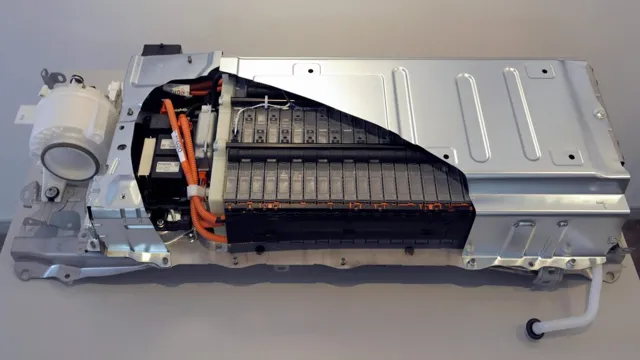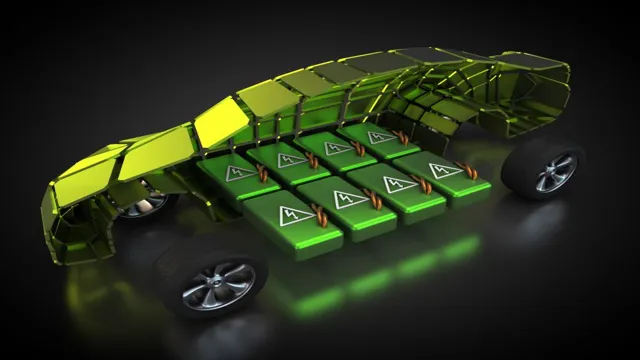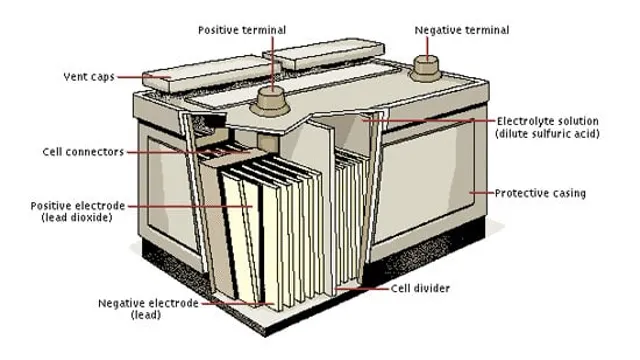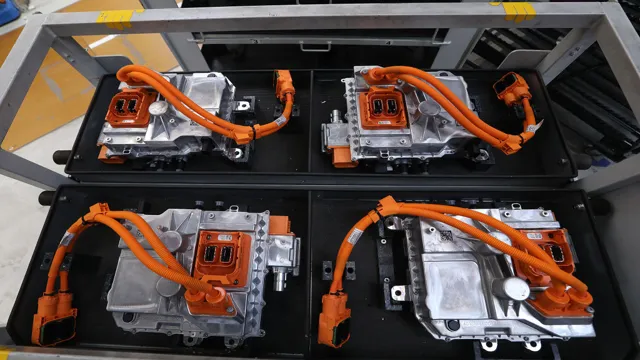Revolutionizing Transportation: How Battery-Powered Electric Cars Are Shaping The Future
Electric cars and batteries have slowly become the norm in today’s world, and it’s easy to see why. Not only are these vehicles eco-friendly, but they also emit minimal to no harmful pollutants. But how exactly do these futuristic cars work, and what makes their batteries so special? In this blog, we’ll delve into the intricacies of electric cars and batteries and explore the technology behind them.
So fasten your seatbelts and get ready to discover the inner workings of the electric car revolution!
Electric Cars Overview
Yes, electric cars use batteries as their primary source of power. In fact, the batteries are the most essential component of the vehicle’s power system. These batteries store energy from an external power source, which can then be used to power the electric motor that propels the car.
The most common type of batteries used in electric cars is lithium-ion batteries, which are known for their high energy density and long lifespan. However, unlike traditional gasoline-powered cars that can be refueled in minutes, electric cars take a longer time to recharge their batteries. This is one of the reasons why there are concerns about the practicality of using electric cars for long distance travel.
Nonetheless, with advances in battery technology and the development of better charging infrastructure, electric cars are becoming increasingly popular as a more sustainable and environmentally-friendly alternative to gas-powered vehicles.
Electric Cars Definition & Benefits
Electric cars, also known as EVs, are vehicles that are powered by one or more electric motors, rather than an internal combustion engine. These cars use electricity stored in rechargeable batteries that provide the necessary energy to run the motor. One of the major benefits of an electric car is that it produces zero emissions, making it an environmentally friendly transportation option.
In addition, electric cars are known for their efficiency in terms of energy consumption and maintenance costs. While the upfront cost of purchasing an electric car may be higher than a gasoline-powered car, the long-term savings on fuel costs and maintenance expenses can make owning an electric car a more financially beneficial choice. With more charging stations being installed nationwide and a growing range of models to choose from, electric cars are becoming an increasingly viable option for drivers who are looking for a sustainable, cost-effective, and enjoyable driving experience.
Common Types of Electric Cars
Electric cars are no longer a rare sight on our roads as their popularity continues to grow. There are three common types of electric cars: Battery Electric Vehicles (BEVs), Plug-in Hybrid Electric Vehicles (PHEVs), and Hybrid Electric Vehicles (HEVs). BEVs are entirely electric-powered and have large batteries that require charging.
PHEVs have both electric and petrol/diesel engines, allowing you to travel longer distances. The HEVs combine electric power with a fuel engine to offer a more efficient driving experience. All these electric vehicles typically offer a smooth and quiet ride with lower running costs than traditional combustion-engined cars.
They also produce no direct emissions, making them a more environmentally-friendly option. With the rise of innovative technology, electric cars have become more accessible and ideal for everyday use. Plus, the government offers various grants and incentives to encourage people to switch to electric to reduce greenhouse emissions.
Choosing the right electric car depends on your needs, location, and driving requirements, so it’s essential to do your research before purchasing.
Electric Car Batteries
Yes, electric cars use batteries as their primary source of power to propel the vehicle. These batteries are rechargeable and store electrical energy in chemical form. Electric car batteries typically use lithium-ion technology, which is lightweight, durable, and high-performing.
They are designed to provide enough energy to propel the vehicle and typically have a range of around 100-300 miles per charge. Electric car batteries require regular maintenance and replacement once they reach the end of their lifespan, which can be anywhere from 8-10 years, depending on usage and climate. Despite the upfront cost of the batteries, electric cars are generally cheaper to operate and maintain than traditional gas-powered vehicles, making them a popular choice for environmentally conscious car buyers.
How Do Electric Car Batteries Work?
Electric car batteries are a marvel of modern technology, powering the green revolution every bit as much as wind and solar energy. Essentially, an electric car’s battery works by converting stored chemical energy into electricity to power the vehicle’s motor. The vast majority of electric car batteries are made up of lithium-ion cells, similar to those found in your smartphone or laptop.
These cells are wired together in series to create a battery pack with enough voltage to move the car down the road. Unlike traditional combustion engines, which run out of fuel and need to be refilled, electric car batteries simply need to be recharged. This is usually done by plugging the car into a power source, but some models can also regenerate energy from braking and coasting, extending their range even further.
While electric car batteries still have some limitations, such as charging time and range, they represent a major step forward in the transition to clean, sustainable transportation.
Types of Electric Car Batteries
Electric car batteries are an essential component in any electric vehicle. They store and supply power to the car’s motor, making it run. There are different types of electric car batteries, each with its unique features and advantages.
Lithium-ion batteries are the most common type of battery used in electric cars due to their high energy density and long-lasting charge. These batteries are incredibly efficient and have a long life span. Nickel-metal hydride (NiMH) batteries are also used in electric cars and were prevalent before lithium-ion batteries became dominant.
Though not as energy-dense as lithium-ion batteries, NiMH batteries are cheaper, making them more accessible. Finally, there are lead-acid batteries, which are the oldest type of battery technology and are still being used in some electric cars today. However, they are less efficient than other battery types, have a shorter lifespan, and are environmentally unfriendly.
As technology advances, car manufacturers continue to develop batteries with better energy storage and longer life.
Battery Life & Maintenance
Electric car batteries are essential to powering any electric vehicle (EV). It is vital to the smooth operation of your EV to keep up with its battery life and maintenance. With advances in technology, electric car batteries have become more reliable and can last for years with proper care.
However, like any battery, its lifespan is limited. There are many factors that contribute to the battery life of an electric car, including temperature, driving habits, and charging patterns. By monitoring your EV’s estimated range and charging regularly, you can ensure optimal battery health.
Remember, just like your cellphone or laptop, keeping your electric car battery healthy is crucial to enjoying your vehicle for years to come.
Impact of Electric Cars
Electric cars use batteries for power storage. In fact, this is one of the most important components of an electric car. The battery pack serves as the main source of power for the electric drivetrain that propels the car forward.
The batteries used in electric cars are usually lithium-ion batteries, which are known for their high energy density, long life, and relatively low cost. They are also recyclable, which makes them an environmentally friendly choice. One of the benefits of using lithium-ion batteries in electric cars is that they can be recharged quickly and last for hundreds of miles on a single charge.
This means that electric cars can serve as a reliable and efficient mode of transportation for daily commutes, long drives, and even road trips. With growing concerns around environmental pollution and the need to reduce carbon emissions, electric cars are becoming increasingly popular as a more sustainable and eco-friendly alternative to traditional gasoline-powered cars. As more countries and manufacturers invest in electric car technology, we can look forward to a future where electric cars become the norm and help to reduce our reliance on fossil fuels and combat climate change.
Environmental Benefits & Concerns
Electric cars have the potential to make a significant positive impact on our environment. Unlike traditional gas-powered cars, electric cars emit significantly less harmful pollutants into the atmosphere, leading to cleaner air and a healthier environment. Furthermore, with advancements in battery technology, electric cars now offer impressive ranges and quick charging capabilities, making them more practical and convenient for everyday use.
However, some concerns remain, such as the environmental impact of producing batteries and generating electricity to power the cars. Additionally, the production and disposal of batteries can have negative effects if not managed properly. Despite these concerns, the overall environmental benefits of electric cars make them an important step towards a greener and cleaner future.
Economic Impact & Future Outlook
Electric Cars have the potential to make a significant economic impact in the near future. With rising concerns over air pollution and global warming, electric cars offer an environmentally friendly alternative to traditional gas-powered vehicles. It is projected that the market for electric cars will continue to grow, with more manufacturers investing in the development of electric cars.
This will result in increased employment opportunities in the auto industry, especially in the manufacturing and servicing of electric vehicles. While electric cars are more expensive than traditional cars, the cost of ownership is lower due to cheaper fuel and maintenance costs. This will result in consumer savings and increased disposable income.
With the continued growth of the electric car market, the future outlook is promising, and it is anticipated that electric cars will become more affordable, creating a ripple effect throughout the auto industry. As we move forward, it is important to consider the potential economic impact of the shift toward electric vehicles and the benefits they can bring to consumers, businesses, and the planet as a whole.
Conclusion
In summary, electric cars use batteries just like we use our smartphones – to power our daily lives and keep us connected to the world around us. But unlike our phones, electric cars have bigger and bolder ambitions – to reduce carbon emissions, increase energy efficiency, and revolutionize the way we travel. So whether you’re a tech-savvy driver or an environmental enthusiast, there’s no doubt that the electrification of transportation is a trend worth plugging into.
“
FAQs
What type of batteries do electric cars use?
Electric cars use rechargeable lithium-ion batteries.
How long do electric car batteries last?
The lifespan of electric car batteries varies, but on average, they last between 8-10 years or approximately 100,000 miles.
Are electric car batteries expensive to replace?
While the cost of replacing an electric car battery can vary depending on the make and model of the car, they tend to be more expensive than traditional combustion engine car batteries.
Can electric car batteries be recycled?
Yes, most electric car batteries can be recycled, and recycling programs are becoming more widely available as electric car use increases.





